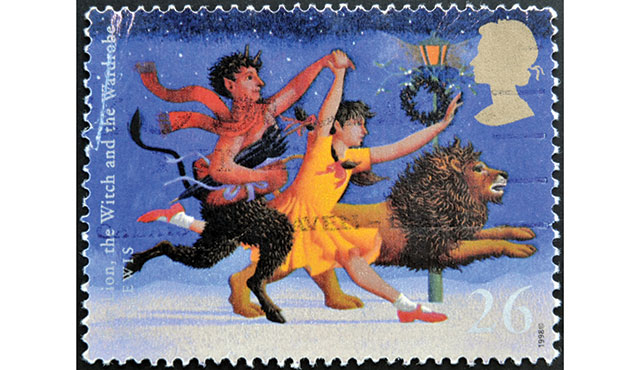One of my fondest childhood memories is listening in fascination with my
Holy Family elementary school classmates as our teacher read aloud to us.
The stories I remember most come from the classic C.S. Lewis tale, “The Lion, the Witch, and the Wardrobe.”
The vivid mental images of the magical wardrobe, the snowy crunch of forest paths, and the wonders of the fantastic Narnia captured my young imagination. As an adult I can see plainly the allegorical references to Jesus (Aslan the lion), Mary (our heroine, Lucy), Satan (Lucy’s evil brother, Edmund) and the Jewish people (Mr. and Mrs. Badger), among many others. As beloved as the seven-volume “Chronicles of Narnia” was to me as a child, I was thrilled to read them our three children.
Until fairly recently I was unaware of Lewis’s close friendship with faithful Catholic J.R.R. Tolkien, while I knew of his serious scholarship. I love thinking about the two of them quaffing pints in an Oxford tavern as they debated Catholicism or critiqued each other’s works of fantasy.
Besides “The Lion, the Witch, and the Wardrobe,” our children loved Tolkien’s “The Hobbit” and the “Lord of the Rings” trilogy as much as the Harry Potter series.
Lewis biographer Joseph Pearce notes that the two men bonded over their experiences in World War I, the loss of their parents early in life, and their literary and teaching careers. “They both avoided contemporary culture, neither had a car nor would drive one, and both largely ignored politics and the news,” Pearce writes. “And in their fledgling efforts as novelists, they served as each other’s first readers. ‘The unpayable debt that I owe to him was not influence but sheer encouragement,’ Tolkien wrote decades later. ‘He was for long my only audience.’”
Perhaps surprisingly, Lewis never embraced Catholicism. As Pearce writes in Catholic World Report, “A lesser known but nonetheless powerful part of C.S. Lewis’ legacy is the impact that he has had on the conversion of countless numbers of people to the Catholic Church.
“This is indeed an astonishing phenomenon considering that Lewis never became a Catholic himself, unlike many other literary converts, such as John Henry Newman, Gerard Manley Hopkins, G.K. Chesterton, Evelyn Waugh, and Graham Greene, to name but an illustrious few,” Pearce writes.
He says that his friendships with people like Tolkien helped convert Lewis from atheism to Christianity. But like other scholars, Dr. Thomas Howard, writing in CatholicCulture.org, speculates that Lewis – raised Protestant in Northern Ireland – opposed the papacy and thus never seriously considered becoming Catholic.
This is somewhat ironic, considering that many prominent Catholic authors mention Lewis frequently as a key influence on their work. I find it poignant that as close as he came, Lewis never entered the Catholic Church.
After all, Lewis “believed in the real presence of Christ in the Eucharist, which he referred to as the Blessed Sacrament; he practiced auricular confession; he vehemently opposed female ordination, condemning in forthright terms the danger of having “priestesses in the Church”; he declared his belief in purgatory and in the efficacy of praying for the dead; and, last but not least, he crusaded against the errors and heresies of theological modernism,” Howard writes.
“It is perhaps, therefore, not so surprising that C.S. Lewis has ushered so many people into the Catholic Church.”

